Title: Strategies for Landlords to Enhance Tenant Retention Amid High Mobility
Introduction
In the era of high mobility, where relocation for career opportunities, lifestyle changes, or financial considerations is commonplace, tenant turnover poses a significant challenge for landlords. Tenant retention is crucial for maintaining steady rental income, minimizing vacancy periods, and reducing the costs associated with finding new tenants. To effectively address the issue of high tenant mobility, landlords must adopt proactive strategies that emphasize tenant satisfaction and long-term residency. This article explores several key strategies for enhancing tenant retention in today’s dynamic rental market.
- Fostering Strong Relationships
Building positive relationships with tenants is the cornerstone of tenant retention. Landlords who are accessible, responsive, and genuinely interested in the well-being of their tenants create a sense of community and trust. This can be achieved through regular communication, addressing tenant concerns promptly, and showing appreciation for long-term tenants. A simple gesture, like a holiday card or a thank-you note, can go a long way in making tenants feel valued.
- Offering Flexible Lease Terms
In a world where career advancement and life changes often require mobility, flexible lease terms can be appealing to tenants. Offering options such as short-term leases, month-to-month arrangements, or easy lease renewal processes can accommodate tenants’ varying needs. By being flexible, landlords can reduce the likelihood of tenants moving due to inflexible leasing terms.
- Competitive Rent and Incentives
Ensuring that rental rates are competitive within the local market is critical. Overpriced rent may drive tenants to seek more affordable options. Consider offering incentives for lease renewals, such as a small rent discount, upgrades to the unit, or a one-time service offering, like professional cleaning. These incentives can make the idea of renewing a lease more appealing than starting anew elsewhere.
- Modernizing and Maintaining Property
Regular maintenance and timely upgrades to the property can greatly enhance tenant satisfaction. A well-maintained property not only attracts new tenants but also encourages existing tenants to stay longer. Investing in energy-efficient appliances, aesthetic upgrades, or smart home features can add significant value to the rental property, making it more desirable for tenants to remain.
- Implementing Community Engagement Initiatives
Creating a sense of community can greatly enhance tenant retention. Organize regular events such as barbeques, holiday parties, or community clean-up days to foster a sense of belonging among tenants. Community engagement initiatives help create a living environment where tenants feel connected to their neighbors and surroundings, reducing the likelihood of turnover.
- Providing Excellent Customer Service
A high level of customer service can distinguish a property from others and encourage tenant loyalty. This includes promptly addressing maintenance requests, having a clear and open communication line, and providing digital solutions such as a tenant portal for rent payments and service requests. Happy tenants are more likely to renew leases and recommend the property to others, potentially reducing vacancy rates.
- Utilizing Technology and Big Data
Leveraging technology and big data can provide insights into tenant behaviors and preferences. Landlords can use data analytics to predict tenant needs and personalize their renting experience. From customizable living spaces to tailored community events, technology can help landlords stay ahead of tenant expectations and improve overall satisfaction.
Conclusion
In a transient world, landlords who prioritize tenant retention can not only stabilize their rental income but also cultivate a community that attracts and keeps high-quality tenants. By adopting strategies that focus on tenant satisfaction, flexibility, and engagement, landlords can mitigate the effects of high mobility and foster a thriving, long-term tenant base. Proactively enhancing the tenant experience is a smart investment that pays dividends in tenant loyalty and reduced turnover costs.

